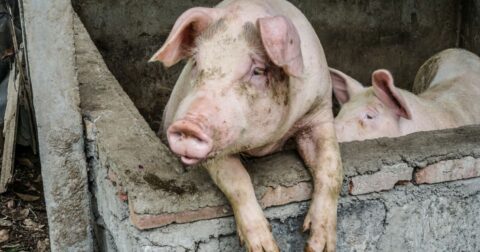Investigation
Oklahoma’s Loophole: How Tyson’s Water Use Goes Unchecked
Food•15 min read
Reported
A coalition of lawmakers are backing the EATS Act in hopes of gutting the Supreme Court's decision upholding the welfare provisions of California's Prop 12.


Words by Marlena Williams
Less than six weeks after the U.S. Supreme Court upheld California’s landmark animal welfare law, Proposition 12, lawmakers from major farming states have banded together in an attempt to effectively gut this critical decision. On June 15, Senator Roger Marshall (R-Kansas) reintroduced the Ending Agriculture Trade Suppression Act, or EATS Act, into Congress. The EATS Act is a controversial piece of legislation designed to prevent states and local jurisdictions from regulating the production and distribution of agricultural products within their borders that are subject to interstate commerce.
If passed, the EATS Act could jeopardize Proposition 12 and hundreds of other state and local laws that regulate animal welfare, food safety and public health. Though the EATS Act has failed in the past, the backlash to Prop 12 could build momentum towards its passage. Here’s what you need to know about the EATS Act, and what it could mean for the future of animal welfare.
In 2018, a majority of California voters approved Proposition 12, a ballot measure that prohibits the in-state production and sale of certain pork products sourced from pigs held in extreme confinement. The law bans the use of gestation crates — narrow metal cages barely larger than the body of your average adult pig — and instead requires pork producers to provide pigs with enough space to stand up, lie down, turn around and stretch their limbs. The law also requires more space for egg-laying hens and calves raised for veal.
Though it’s groundbreaking, Prop 12 does have many limitations: the production of many types of pork, including ground pork and deli meat, is not covered by the law, and the extra space Proposition 12 requires — about 24 square feet per pig (up from 14) — also won’t change the fact that most female pigs will still spend their entire lives in confinement.
But Proposition 12 still represents a major step forward that could force significant changes across the industry and open doors for more and better legislation in the future. Which is precisely why those who stand to profit from less humane production standards are so committed to stopping it.
The EATS Act is a direct response to the Supreme Court’s 5-4 decision upholding Proposition 12, which gave the greenlight for similar legislation, such as Question 3 in Massachusetts, to move forward.
“California’s Proposition 12 is going to hurt the economy of Iowa, which is number one in pork production,” said Senator Chuck Grassley (R-IA), one of the bill’s co-sponsors. “We have to solve this problem by passing legislation. Our bill makes sure Iowa pork can be sold everywhere in the nation, including in California, and consumers can afford bacon for breakfast.”
Modeled after the controversial King Amendment, the EATS Act would essentially override any state law regulating agricultural products within that state’s borders, requiring states to sell goods produced in cruel or unsafe conditions — even if the majority of citizens voted against just that.
Though the Supreme Court held that California’s law passes constitutional muster because it applies equally to all pork produced in the country — meaning it doesn’t burden some states to the benefit of others — legislators from top pork producing states are nonetheless eager to challenge any and all restrictions on their ability to make and sell their products nationwide.
“Liberal states like California are free to regulate agricultural producers within their borders, but that ends when their overregulation harms producers thousands of miles away,” said another of the bill’s sponsors, Senator Kevin Cramer (R-ND.) “This bill will prohibit individual states and localities from legislating outside their jurisdiction by imposing de-facto regulations on the states who feed them.”
The EATS Act wouldn’t just threaten pig welfare. It would effectively strip states of any power to regulate the kind of agricultural products that enter their borders, imperiling progressive legislation that targets puppy mills, animal testing, the wildlife trade, pesticide use, chemicals in baby food, pollution and many other laws designed to protect public health and safety.
The law also contains an expanded citizen suit provision that would allow any individuals, businesses or trade associations impacted by a state or local regulation to sue their state or local officials to obtain an injunction and seek monetary damages. According to the Humane Society Legislative Fund, the citizen suit provision also flips the burden of proof so that state and local governments are on the hook for damages unless they can prove that they are in compliance with the EATS Act.
Representative Ashley Hinson (R-IA) plans to introduce a companion bill into the House soon.
The EATS Act will likely be contentious. The King Amendment that inspired it was highly criticized on both sides of the aisle and failed to make it into both the 2014 and 2018 Farm Bills. An earlier version of the EATS Act also failed to pass in 2021.
But it is possible that opposition to Proposition 12 could help propel the EATS Act forward. Three of the bill’s nine co-sponsors are members of the Senate Committee on Agriculture, Nutrition and Forestry, and some lawmakers are pushing to make the EATS Act part of the 2023 Farm Bill, which is up for renewal this September. Glenn “G.T.” Thompson, the Chairman of the House Agriculture Committee, has expressed his disappointment with the Supreme Court’s ruling and his hope that the Farm Bill will contain language undermining the decision.
Earlier this month, a coalition of 11 governors from major agricultural states also wrote a letter to Congress urging them to pass legislation like the EATS Act that would void Proposition 12 and other similar laws.
Still, the future of the EATS Act remains uncertain.
In his majority opinion in National Pork Producers Council v. Ross, the Supreme Court case upholding Proposition 12, Justice Neil Gorsuch expressed skepticism that legislation like EATS could easily pass in Congress.
“It is hard not to wonder whether petitioners have ventured here only because winning a majority of a handful of judges may seem easier than marshaling a majority of elected representatives across the street,” Justice Gorsuch wrote.
Though there is significant industry support for the EATS Act, many food producers like Hormel and Tyson have already signaled their willingness to comply with Proposition 12 and adopt improved living conditions for their farmed animals.
Even groups that are not expressly interested in animal welfare oppose the EATS Act as an unconstitutional attack on state’s rights.
“This legislation could wipe out hundreds of laws passed by state and local legislations that benefit family farms over international conglomerates, as well as those that support dairy farmers, baby food safety and control the infestation of invasive pests,” said the Organization of Competitive Markets, which recently launched a campaign opposing the EATS Act.
Public opinion is also on the side of laws like Proposition 12 and other regulations related to animal welfare. A 2022 Data for Progress survey showed that about 80 percent of respondents would support legislation similar to Proposition 12 in their states, and another survey conducted by the ASPCA shows overwhelming support for more humane treatment of farmed animals. In fact, a ban on gestation and veal crates just passed in the New Jersey state Senate with support from 93 percent of the state’s residents and is currently awaiting a signature from Governor Murphy.
A handful of lawmakers from pork producing states want to restrict the ability of individual states to regulate agricultural products in accordance with their citizens’ wishes. But laws like Proposition 12 show that a growing number of Americans want better living conditions for the nation’s billions of farmed animals.
This piece has been updated to correct the name of the Humane Society Legislative Fund.